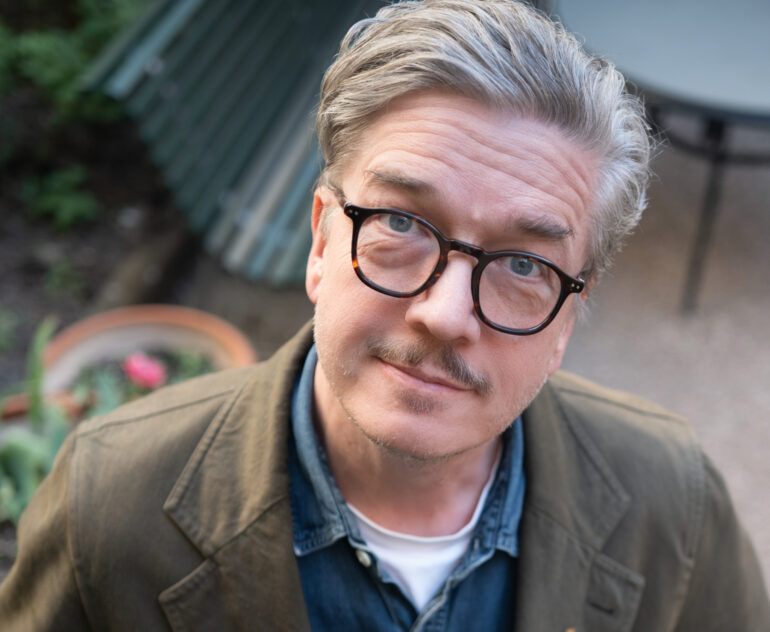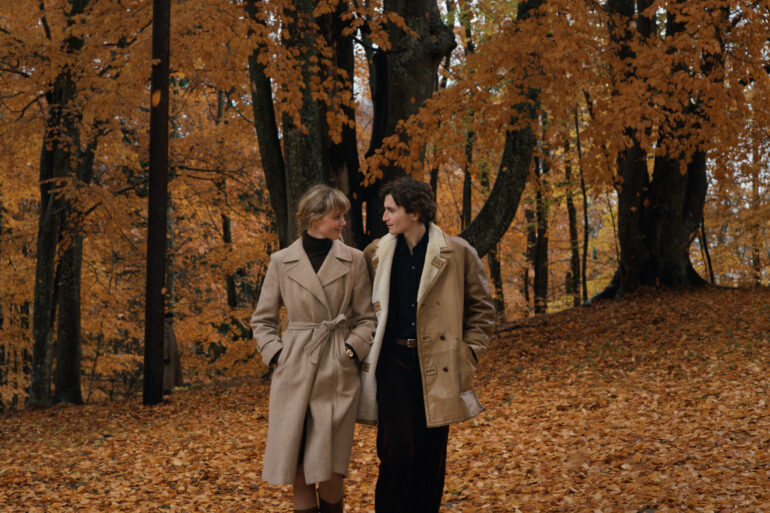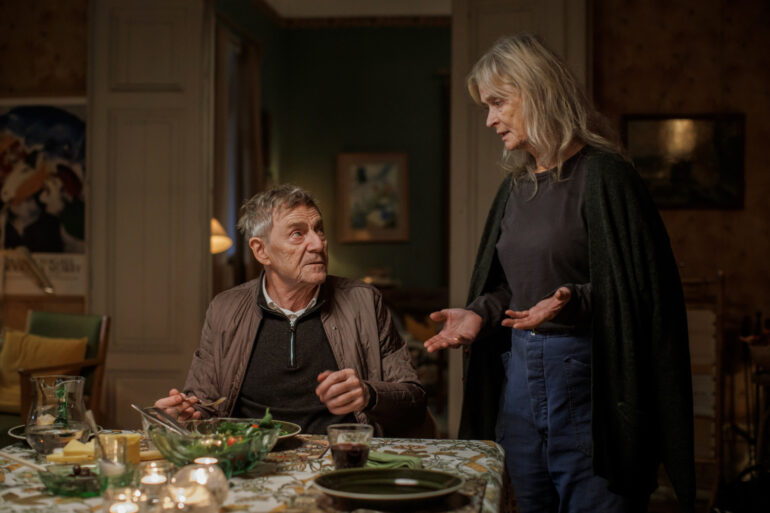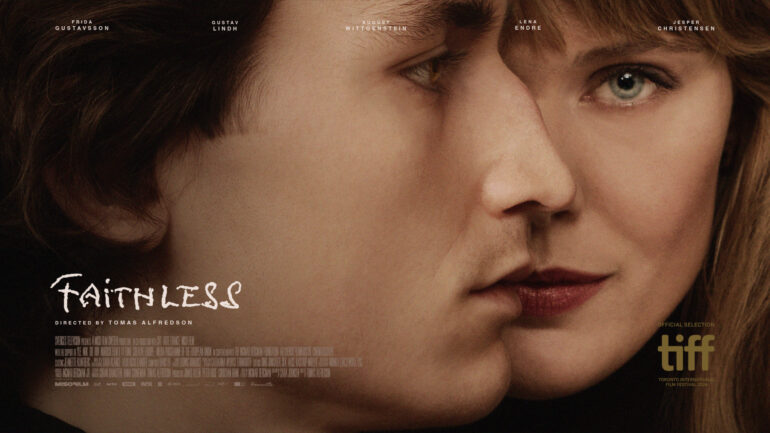WRITTEN BY: Davide Abbatescianni
24 years after Liv Ullmann’s feature, the Swedish helmer behind Let the Right One In and Tinker Tailor Soldier Spy revisits the story in a six-episode tale, set between 1977 and the present day.
NFTVF caught up with Tomas Alfredson, director of the brand-new series adaptation of Faithless (Trolösa), based on one of Ingmar Bergman’s final screenplays, penned in 1995 and later transposed onto the big screen by Liv Ullmann. The feature of the same name starred Lena Endre and Erland Josephson in the leading roles, and premiered at the Cannes Film Festival in 2000.
Faithless is said to be inspired by events that unfolded in 1949, and by Bergman’s relationship with Gun Grut, later known as Gun Bergman.
The acclaimed Swedish helmer behind Let the Right One In (Låt den rätte komma in) and Tinker Tailor Soldier Spy has reinterpreted Bergman’s original work from scripts adapted by 22 July (22. juli) writer Sara Johnsen and turned it into a six-episode drama, which world-premiered at this year’s Toronto International Film Festival. The series was produced by Peter Bose with Christian Rank and Jonas Allen, and has received support from DR, NRK, YLE, RÚV, and NFTVF.
The story follows a love triangle told across two time periods – 1977 and the present day. In the present day, famed 73 years old director David Howard (Jesper Christensen, with Gustav Lindh portraying him in 1977) is reunited with his former great love, 75 years old actress Marianne Vogler (Endre again, played by Frida Gustavsson in 1977). Their encounter forces them to confront the painful consequences of their past relationship, not only for themselves, but also for their families. Forty years prior, a young David and Marianne find themselves entwined in a passionate love affair, which they must keep secret, as Marianne is married to David’s best friend, Markus (August Wittgenstein).
During our chat, Alfredson discussed the making of this deeply personal project and unpacked some of his main technical and artistic choices.
First of all, how did you embark on the project, and why did you choose to revisit Faithless through a series format?
It all started 20 years ago when I saw Ullmann’s adaptation. I thought it was a fantastic story, and I felt jealous for the first time in my life. I tried to understand why. This film, for some reason, really struck me. So I asked Mr. Bergman if he would allow me to work on a new adaptation. He was really interested, and we discussed it. So that's how it all started, but for several reasons, it didn't happen back then. Then I revisited the idea a few years ago, and one of the things I felt with the original adaptation was that it’s too long for a film, but too short for what it is covering. It lasts about two hours and forty minutes, but it still feels a bit short. So that’s why I thought it was a great opportunity to delve deeper into the storytelling by making it for TV. In this sense, TV is more “forgiving”; it allows you to explore different points of view, while the feature is much stricter in its rules.
Zooming in on the casting process, what type of qualities were you searching for in the actors, particularly those playing David and Marianne?
The biggest challenge was to find actors playing the same roles at two different ages, and you know, this isn’t about making an impersonation. It's about finding souls that are alike, somehow. It's not so much about finding someone with the right features, the right nose, or the right hair. It's about capturing the soul of a character. It’s been one of the hardest casting processes I’ve ever done, and it took quite a while to put the ensemble together. But I think we’ve found four very strong actors.
What guided you in picking the right actors?
When I audition actors, I usually try to imagine their characters as animals. So, for example, I might be looking for a horse. And if you're looking for a horse, this makes you much freer when it comes to choosing an actor, because if you tell yourself, “I need a woman, aged 35, tall, sporting blonde, long hair, with this particular kind of voice….” Well, this limits you a lot. But if you say, “I'm looking for a horse running in the fields”, your choices multiply, and you don’t limit yourself by just looking at their physical appearance…
What about your work with actors? How much freedom do they get while performing?
When I'm working on set, my main task is to make people feel comfortable. Hopefully, before filming we’ve sorted out most of the questions, we’ve done table reads and had discussions… So if they feel comfortable, they usually dare more. And that's what filmmaking is about. It's about daring, showing yourself, and being real in front of the camera. And if I can create the right environment for people to be focused while keeping it informal and comfortable, I can achieve that goal. I think I’m pretty good at doing this, but it's not more complicated than that. Then you have to trust the actors and let them do their stuff.
Could you elaborate on your work with composer Hans Ek?
Hans is one of the most talented and respected arrangers and conductors around. He has made arrangements and orchestral work for me, and I know he’s been composing in the past, but I’d say this is the biggest scoring gig he’s had so far.
We’ve tried to produce an analogue score, where we aimed to highlight each musician, so that we could actually hear not just 100 strings playing together, but also the individual violinists and drummers, making them almost like characters. Besides, we didn’t want to sugarcoat the sound at all. It’s very “dry”, almost in your face. There are also many sequences told without dialogue, resembling silent films, yet accompanied by music, which has become a main character in the storytelling. I’m extremely pleased with what Hans has accomplished, and I think he has succeeded in making this score both personal and impactful for the viewers.
Speaking of your work with DoP Monika Lenczewska, I was wondering whether you shared any external references…
Monika is a fantastic force. I’ve never worked with her before. We first met while planning another film we were about to make in the UK. Then Covid hit, and I reconnected with her. She delivers a nerve and an intimacy in her visual work. I think Monika and I share the same view: We don't like to get inspired by other films, but rather by other artists such as painters and still photographers. Together, we accomplished something that feels so real, “naked” and raw, and we tried to use natural light as much as possible.
This series is a co-production involving a number of partners, including large players such as ARTE, Fremantle, and the five Nordic pubcasters. I presume you kept receiving many inputs and feedback along the way… How did you manage not to lose your compass?
Well, if you compare this with the old days, back then there was one person – usually a man – making the big decisions, someone who also owned the film company. And you’d either work well with this person, or you wouldn’t. But that was an easier environment for a director.
Nowadays, it’s like 30 people showing up on Skype, and everyone wants to contribute, wants to have their say. You can't blame people for wanting to be helpful, but it's almost impossible to juggle all that. As a director, I can't be pleasing 30 different voices. I need to protect my vision and be true to my ideas. So sometimes you find yourself juggling all these different views instead of doing your own work – someone wants this character to be happier, and someone wants the opposite, and so on. I need to trust my instincts, and sometimes I'm not the best person to advocate for my ideas. Hopefully, I’ve got clear intentions and good intuition, and that's what I'm paid for. I'm not paid to make phone calls asking people to change their points of view. As I said, there’s nothing wrong with the individuals. And then there’s the commercial side of things. When marketers enter the project, they say things like “he’s sexy” and “she’s not sexy”. So there’s a lot of pressure put on a director, and sometimes it’s hard to see clearly in this storm.
What are you working on now?
I’m now looking at two interesting TV projects, but nothing official yet. In the near future, I’m about to prep a play for Stockholm’s Royal Dramatic Theatre.



